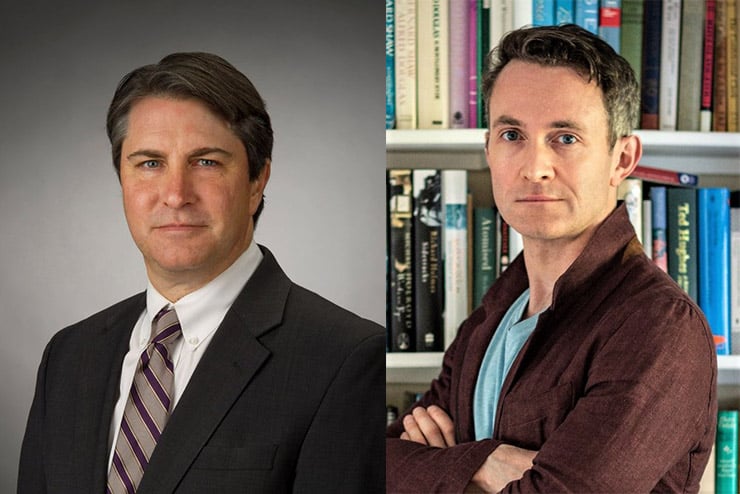Self-described Catholic “post-liberal” Patrick Deneen recently criticized the British neoconservative Douglas Murray for his focus on the antiwhite racism of the woke left, saying that the right should focus on populist economic issues instead. This reveals a grave problem among some self-identifying American conservatives: quite bluntly put, a stubborn unwillingness to acknowledge dangerous tendencies on the left, if their mention may bring the critic some professional or social disadvantage.
There are obviously risky positions today that no professionally ambitious figure who identifies as a conservative would ever dare to take publicly. These perilous positions include fighting—no-holds-barred—with the LGBT lobby, suggesting that certain civil-rights laws turned out to be imprudent, opposing the feminist movement at its roots, arguing that there are demonstrable IQ differences among ethnic groups, and insisting that antiwhite racism is a salient characteristic of the leftist establishment. If a conservative polemicist is trying to build a career, he may try to divert discussion away from these hard positions toward less inflammatory subjects or issues that most leftists don’t really care about. Thus, we have had authorized conservatives identifying their conservatism with such unoffensive subjects as the preservation of classical architecture or the rejection of twelve-tone musical compositions. We also find self-described Catholic conservatives declaiming against the continuing effects of 14th-century nominalism or denouncing Martin Luther’s inexcusable revolt against Rome.
Mind you, I am not suggesting that conservative intellectuals should not engage cultural, economic, theological, or philosophical questions. Our magazine’s contributors do so with regularity, and some, like Anthony Esolen, examine culture and history with vast erudition. But there is a critical difference between those who approach cultural or aesthetic subjects from a traditionalist perspective and those who seem to be doing primarily something else: namely, avoiding the risks of grappling with sticky political problems. Sometimes avowed anti-modernists give the impression of wanting to burnish their conservative credentials without endangering their mainstream status. They know the left is not likely to go after someone who builds his conservatism on fighting things that happened centuries ago, particularly when that person doesn’t also frontally attack the left’s egalitarian creed and call for a larger welfare state.
Deneen went after Douglas Murray in Compact for daring to notice that the defining feature of the modern left is antiwhite racism. One does not have to be a genius or, in Murray’s case, even a friend of Chronicles, to acknowledge an obvious fact. Every day the woke left posts a multitude of tweets calling for the disappearance of white people. The tirades of Ibram X. Kendi and other black activist authors abound in racist invective; and Black Lives Matter (BLM), a black nationalist organization, unleashes violence on American streets. Public education marches in lockstep with this antiwhite racism and pushes Critical Race Theory on young children—when it’s not urging them to reconsider their supposedly fluid genders.
But Deneen scoffs at the attention Murray pays to such trivialities, because Deneen has no time for “liberal regime propaganda.” According to Deneen, “It seems that Murray and Kendi are burning two sides of the same candle, propping up a revolutionary regime by ensuring that everyone remain obsessed by the latest identity outrage.” Being a post-liberal, Deneen, like other writers for Compact, enjoys going after the remnant of free-market capitalism and defending economic redistribution—when he’s not mocking the attention given to antiwhite racial animosity. This occasions a question: Why would the left bother to criticize Deneen and those of his ilk? They seem to be on no ideological collision course with anyone in the establishment, even if they do provide some decorative rhetoric against those who talk about the antiwhite racism that the woke left is now spreading. The highly respectful treatment that Deneen and Compact have received from The Guardian, The Washington Post, and The New York Times makes one wonder whether there is, in fact, nothing insurmountable that separates them from the left, or at least from the left’s perception of them.
Failing to notice what Murray calls to our attention requires a concentrated effort not to face reality. The sometimes quite provocative post-liberal Deneen rightly challenges, in the name of Aristotelianism, John Locke’s social-contract understanding of the state and his accompanying natural-right suppositions. But does Deneen’s theoretical anti-Lockeanism prohibit him from caring about racism directed collectively against white people? Although I fully share Deneen’s skepticism about natural rights and prefer Aristotle to Locke, I must part ways with Deneen concerning what a defense of our civilization should entail. It starts with not turning a blind eye to a real evil. It is impossible for me not to recoil from the ominous character of leftist racism. The question for me is how we should understand why that noxious habit is there and why it continues to grow worse.
Black racists at BLM and other groups are clearly not the only ones responsible for this situation, but they do deserve blame for lashing out relentlessly against whites. America’s black community as a whole has voted consistently for racist demagogues like California Congresswoman Maxine Waters and Chicago Mayor Lori Lightfoot. Finally, blacks must share the blame for not working more energetically to solve their problems of communal violence instead of turning on the police, who are required to deal with the crime committed by blacks against other blacks.
But there is other blame to go around, too, especially among the white left, which stokes racial hatred while pretending to alleviate it. At the end of the day, antiwhite racism is being manipulated by white elites, who are inciting blacks to vent their hatred on disfavored whites and Asians. It may be more useful for Patrick Deneen, a person of obvious analytic talents, to examine this mess rather than pooh-pooh divisions within the “liberal regime.”

Leave a Reply